12 Market Analysis Templates That Don't Suck (2025)
Stop staring at a blank page. Grab one of these 12 free market analysis templates and finally get your research done. For Google Slides, Excel, and more.
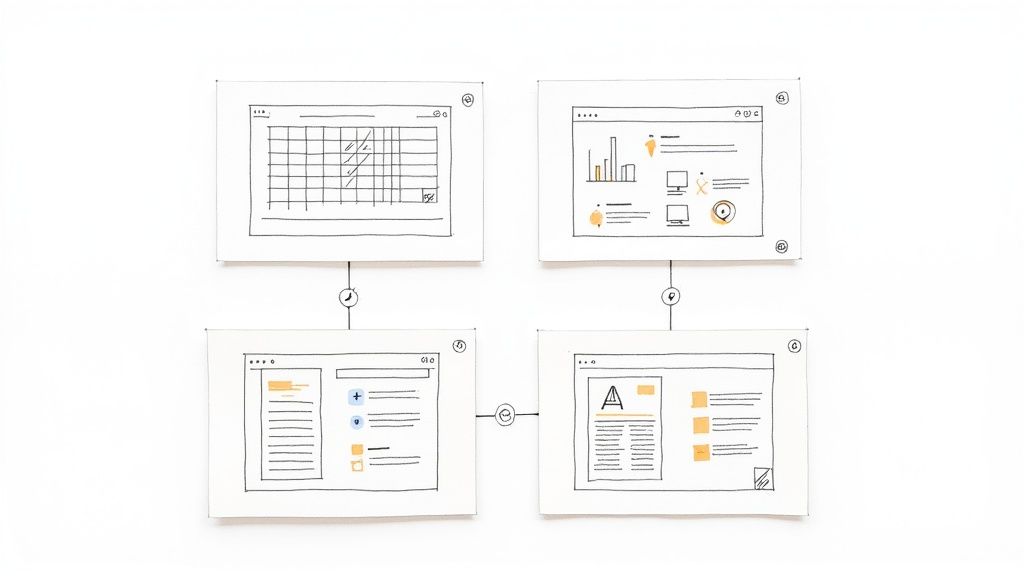
Let's be real: starting a market analysis from a blank page is a special kind of nightmare. You know you need to do it, but the empty spreadsheet just stares back, mocking you. What frameworks should you even use? How do you structure the data? Most importantly, how do you make it look like you actually know what you're doing for that big investor pitch or team meeting?
Forget all that. We've done the frustrating work for you and rounded up the 12 best sources for genuinely useful market analysis templates. This isn't a list of generic, clipart-filled garbage. These are the real-deal templates, from collaborative Miro boards to slick HubSpot slide decks, that will help you organize your research, find killer insights, and present your findings without pulling an all-nighter.
We're cutting straight to the good stuff, with direct links and screenshots. We’ll show you exactly what to expect so you can find the perfect template for your project. And if you need inspiration, check out these industry-specific market analysis examples that show how it's done. Let's dive in.
1. Miro
Miro is less about a single file and more about a giant, collaborative digital whiteboard. It’s perfect for teams that need to brainstorm and map out their market analysis together in real-time. Instead of a static spreadsheet, you get dynamic canvases like the Market Opportunity Analysis or TAM/SAM/SOM frameworks that you can fill with digital sticky notes, comments, and diagrams. It’s the closest you can get to a chaotic, genius-filled workshop room, but entirely online.
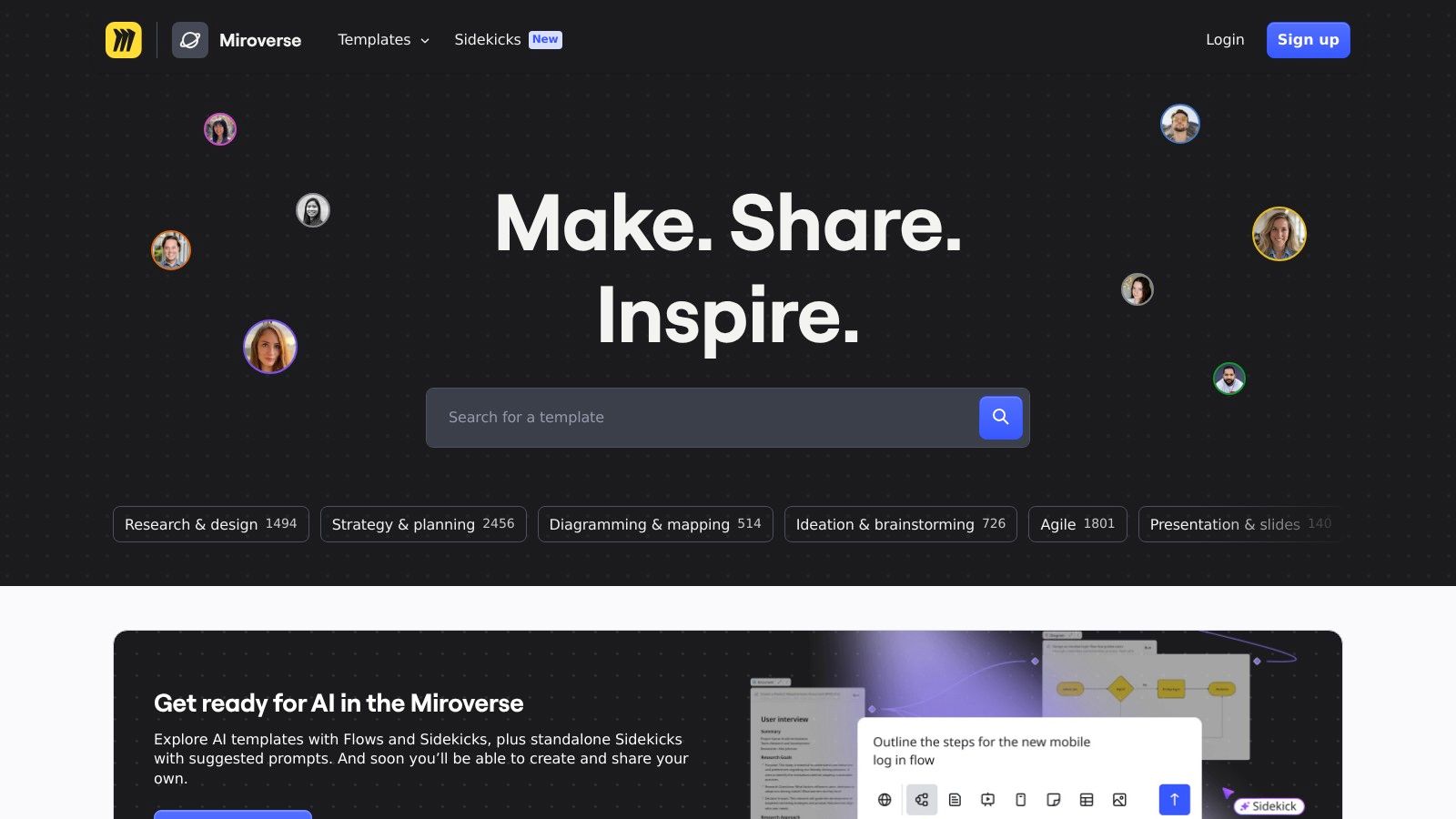
This platform really shines for its collaborative features. You and your team can jump on a board at the same time, making it ideal for remote-first companies. The templates often come with built-in instructions, guiding you through each step of the analysis process.
Why It's a Great Resource
- Best For: Collaborative workshops, remote team brainstorming, and visual market mapping.
- Standout Feature: The "Miroverse" community library offers thousands of free, user-generated market analysis templates beyond the official ones. Some are niche and surprisingly detailed.
- Limitations: The whiteboard format can feel like overkill if you just need a simple document. Also, while many templates are free, you'll need an account, and advanced features are locked behind paid plans.
Website: https://miro.com/templates/
2. Smartsheet
Smartsheet takes a more traditional, business-centric approach. It offers a collection of free, downloadable templates for classic frameworks like SWOT, PEST, and Porter’s Five Forces. You can grab these as standalone Word, Excel, or PDF files, which is perfect if you just need a no-fuss document to fill out. The real power, however, comes when you use these templates within the Smartsheet platform itself.
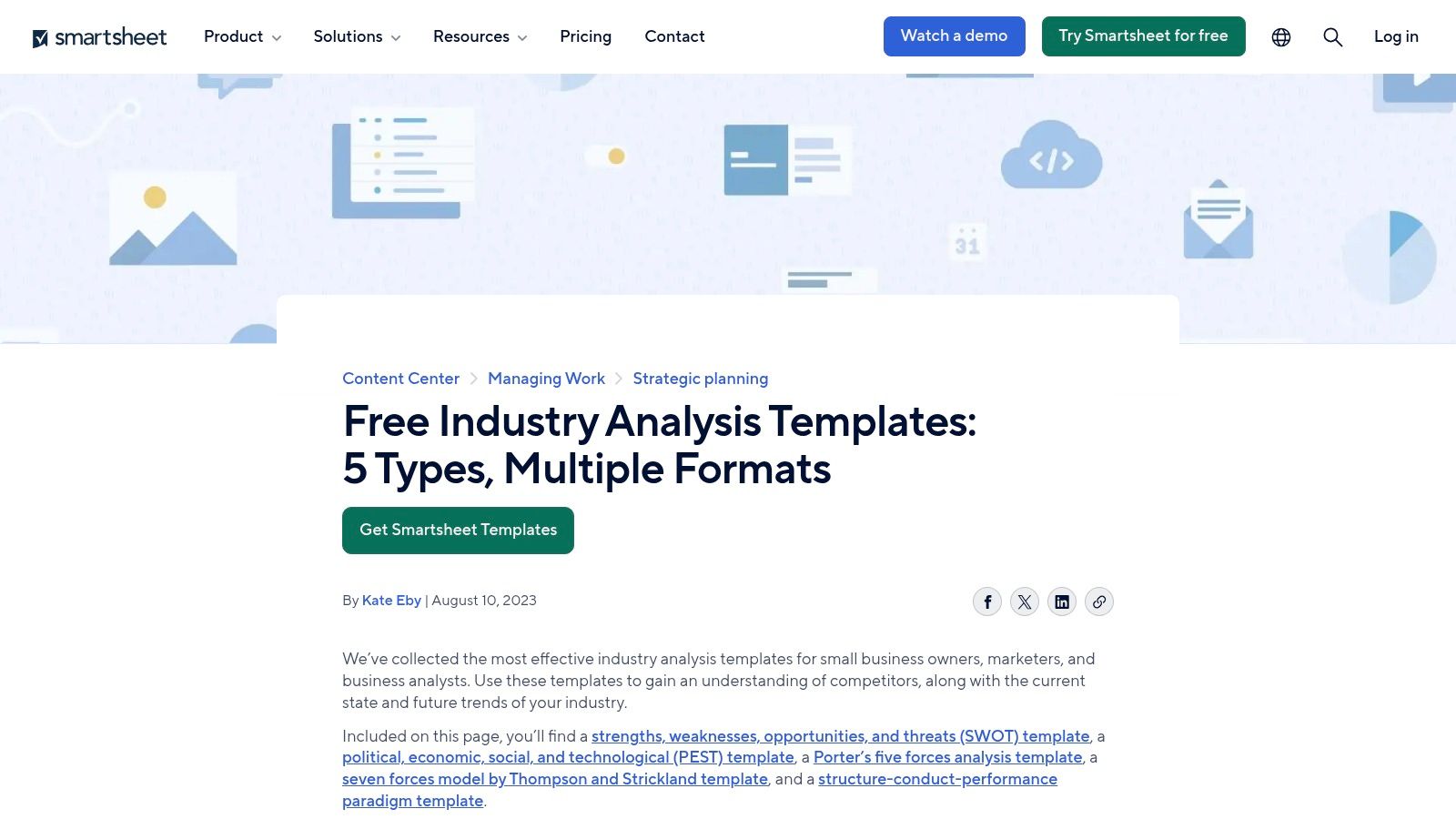
Unlike a static spreadsheet, a Smartsheet template transforms your analysis into a dynamic, trackable project. You can assign tasks, set deadlines, and even build dashboards that pull data directly from your analysis. It moves your analysis from a one-off report to a living document.
Why It's a Great Resource
- Best For: Teams already using Smartsheet, project managers, and anyone who wants to integrate their analysis directly into project workflows.
- Standout Feature: The seamless integration from a simple template into a full-blown project dashboard. This feature bridges the gap between analyzing the market and actually doing something about it.
- Limitations: The downloadable market analysis templates are great, but the advanced tracking and collaboration features are locked behind a paid Smartsheet subscription. Without it, they're just standard files.
Website: https://www.smartsheet.com/content/industry-analysis-templates
3. HubSpot
HubSpot is a go-to for marketers needing to present their findings in a polished, professional format. Instead of a raw spreadsheet, HubSpot provides free, gated presentation templates for PowerPoint and Google Slides. These are designed to guide you through telling a compelling story about your market, from market size to competitive landscapes. They are perfect for when you need to create an investor-ready deck or present to leadership without starting from scratch.
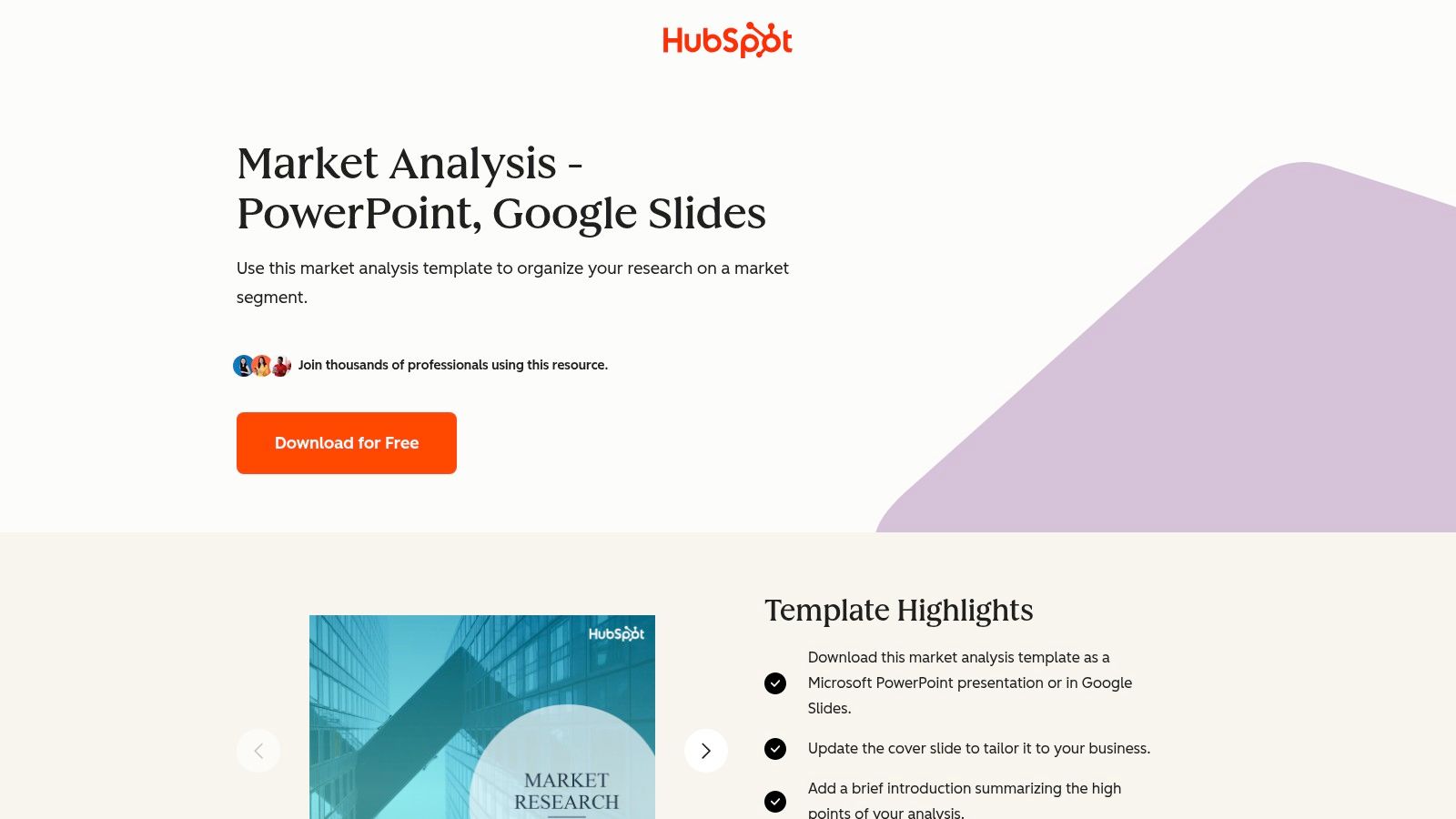
The platform bundles these with other useful resources like competitive analysis and TAM analysis templates, giving you a cohesive toolkit. The structure is already laid out, so your main job is to plug in your research and data. It’s a huge time-saver for busy founders and marketing teams who need to look sharp.
Why It's a Great Resource
- Best For: Startup founders, marketers, and anyone needing to present market analysis findings to stakeholders or investors.
- Standout Feature: The templates are part of a larger ecosystem of free marketing and sales resources. They often link to HubSpot’s educational blogs, giving you context and instructions on how to effectively complete your market analysis templates.
- Limitations: You have to provide your contact info via a lead capture form to download the templates, so expect to end up on their marketing list.
Website: https://www.hubspot.com/resources/templates/market-analysis
4. SlideModel
If you’ve ever wasted an afternoon trying to create a decent-looking diagram in PowerPoint, SlideModel is for you. This platform is a massive library of premium, professionally designed slide decks for business presentations. Their templates are less about raw data entry and more about presenting your findings in a polished, executive-ready format that doesn’t look like it was made in 1998.
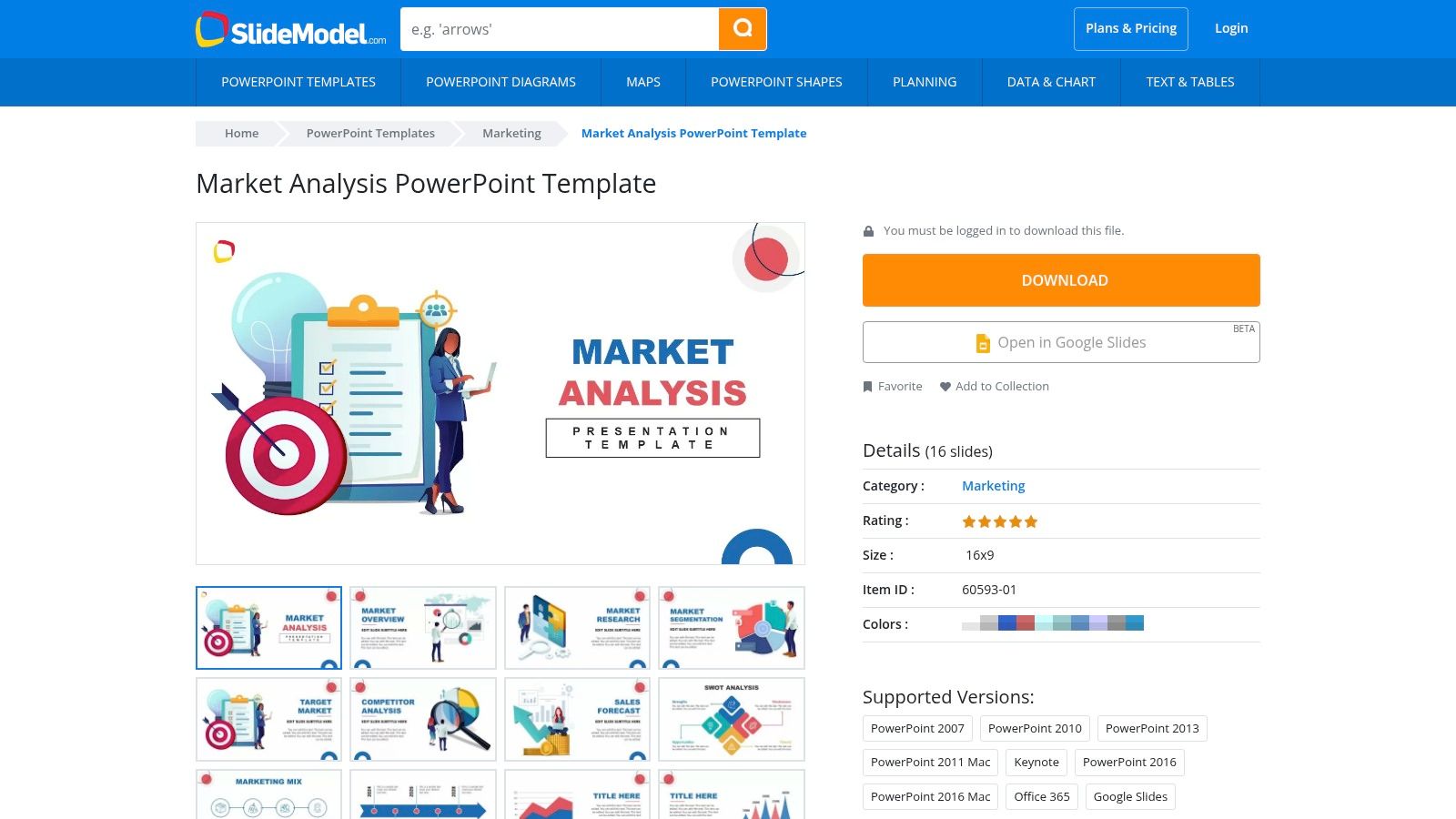
Think of it as a design shortcut for your market research report. Instead of starting from a blank slide, you get purpose-built layouts for Porter's Five Forces, market sizing, and competitive landscapes. Everything is fully editable, so you can easily change colors to match your brand and drop in your own data without breaking the design.
Why It's a Great Resource
- Best For: Founders pitching to investors, consultants presenting to clients, and teams needing high-quality visuals.
- Standout Feature: The sheer variety of niche business diagrams and market analysis templates is impressive. The vector-based graphics scale perfectly without getting pixelated, which is a huge plus.
- Limitations: This is a premium resource. You'll need a subscription to download and use the templates, which might be a barrier for bootstrapped startups.
Website: https://slidemodel.com/templates/market-analysis-powerpoint-template/
5. Envato Elements
If your market analysis needs to look less like a spreadsheet and more like a slick boardroom presentation, Envato Elements is your secret weapon. It’s a subscription service with unlimited access to thousands of professionally designed presentation templates. Think of it as a giant, all-you-can-eat buffet for PowerPoint and Keynote slides, where you can find everything from SWOT analysis layouts to complete competitive landscape decks.
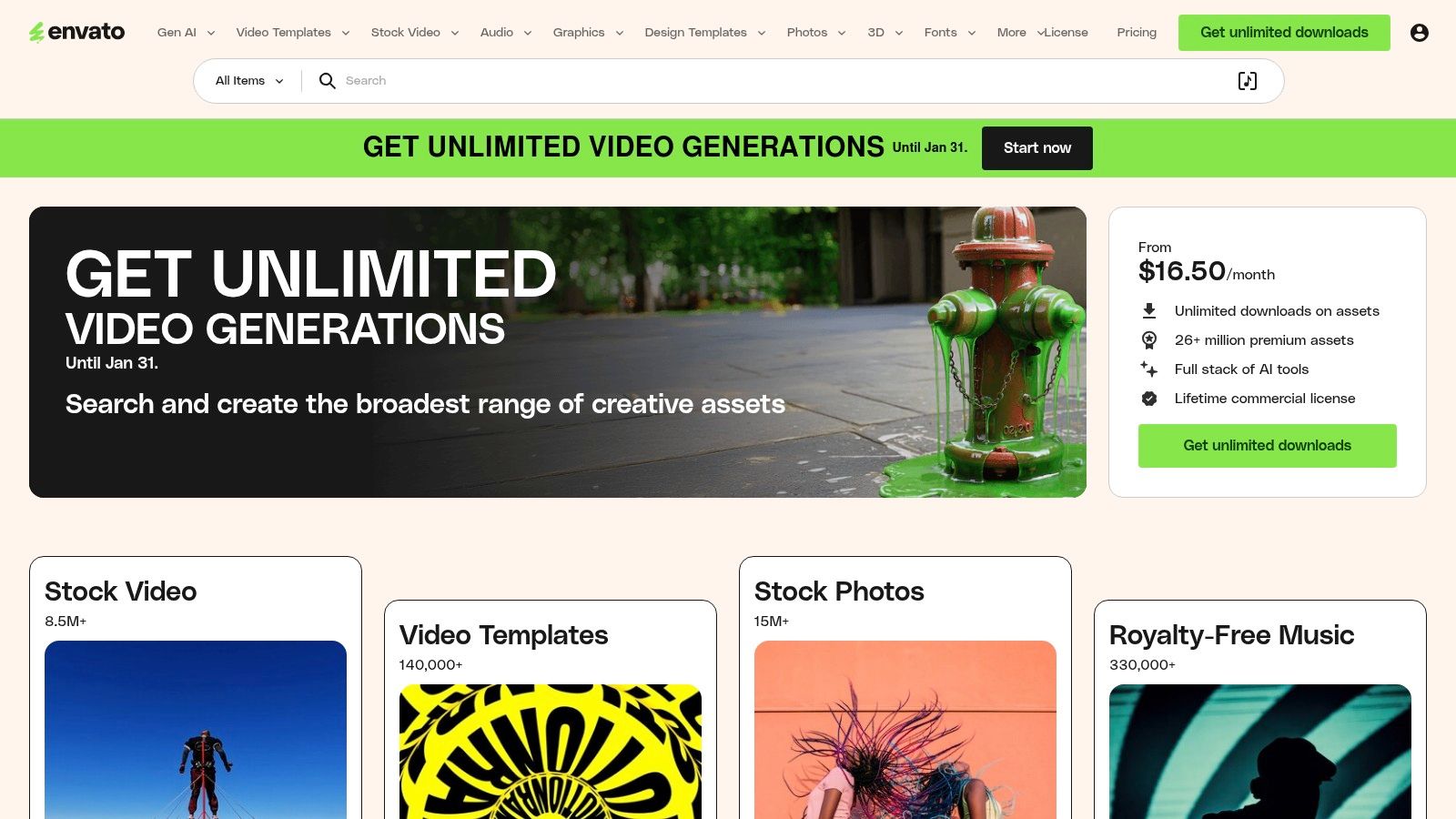
This platform is a goldmine for anyone who needs to present their findings to investors, stakeholders, or the rest of the team. Instead of starting from a blank slide, you get polished, visually engaging market analysis templates that you can fill with your data. Plus, the subscription includes icons, stock photos, and graphics to make your report even more compelling.
Why It's a Great Resource
- Best For: Creating professional, presentation-ready market analysis reports and pitch decks.
- Standout Feature: The unlimited download model is unbeatable. For a single monthly fee, you get access to a massive library of templates plus other creative assets like fonts and graphics, all under one simple commercial license.
- Limitations: It’s an ongoing subscription, which might not be cost-effective if you only need one template. The sheer volume of options can also be overwhelming.
Website: https://elements.envato.com/
6. Canva
Canva is the go-to platform for when your market analysis needs to look as good as it reads. It’s less of a data-crunching tool and more of a design-first platform where you can build stunning presentations and reports. Think of it as the friendly, approachable tool for creating visually compelling SWOT analyses, Porter’s Five Forces diagrams, and competitor breakdown charts without needing a design degree. It’s perfect for turning your raw data into a polished deck that’s ready for a board meeting.
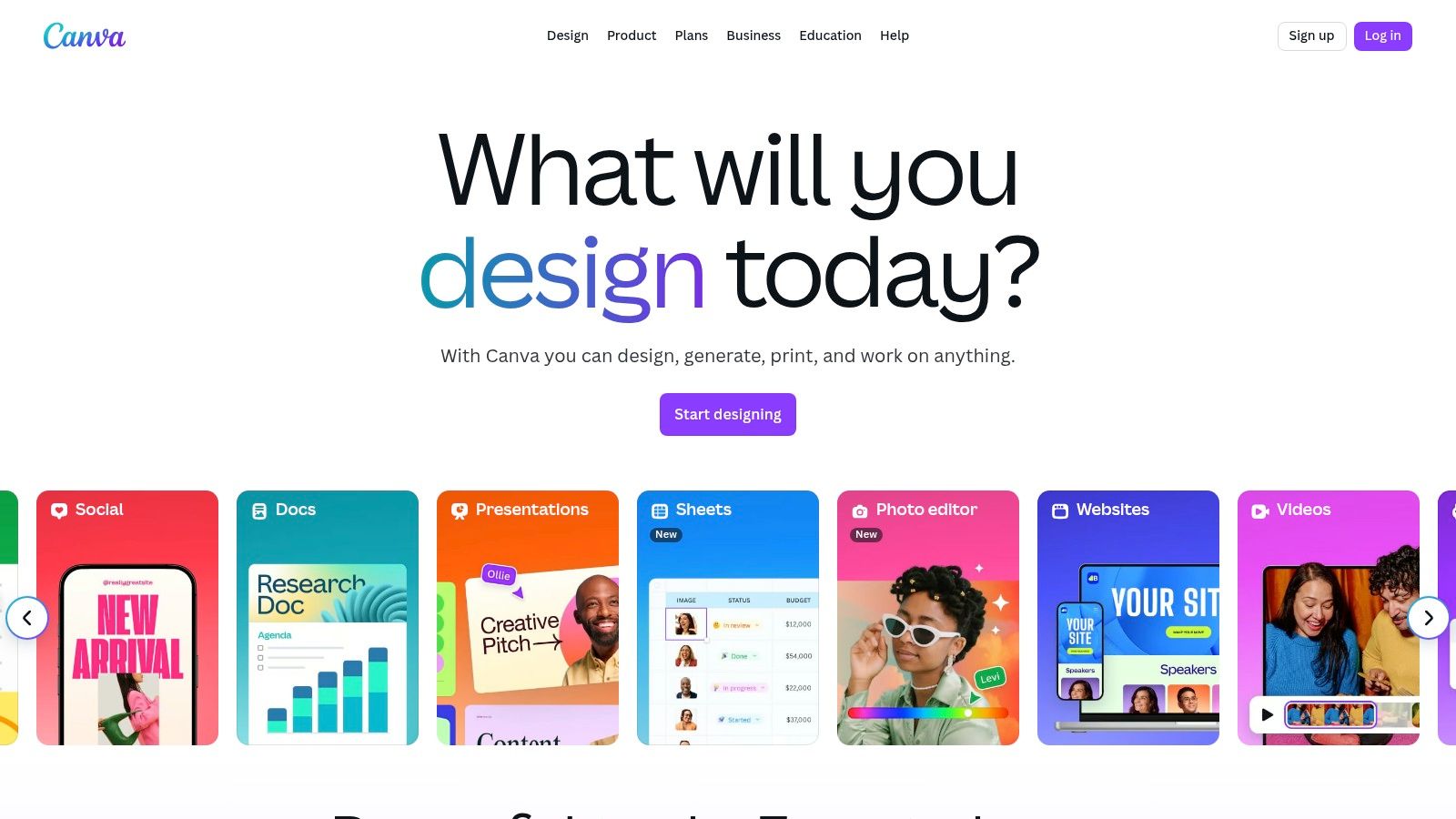
The platform’s strength lies in its massive library of pre-made elements and its simple drag-and-drop interface. You can find a template for almost any analysis framework, customize it with your brand colors, and collaborate with your team in real-time. It’s ideal for the final stage of your analysis when presentation is key.
Why It's a Great Resource
- Best For: Creating polished presentations, visually engaging reports, and collaborative design sessions.
- Standout Feature: Its extensive library includes not just individual market analysis templates but entire presentation decks built around market research, saving you hours of design work.
- Limitations: It’s not a data analysis tool, so you’ll need to do your calculations elsewhere. The best templates and features are often locked behind the Canva Pro subscription.
Website: https://www.canva.com/
7. Template.net
Template.net is the digital equivalent of a massive office supply store’s filing cabinet, stocked with every business document you can imagine. It offers a huge selection of downloadable market analysis templates in familiar formats like Word, Google Docs, and Excel. This platform is less about collaborative brainstorming and more about providing a solid, structured starting point for a formal report or business plan.
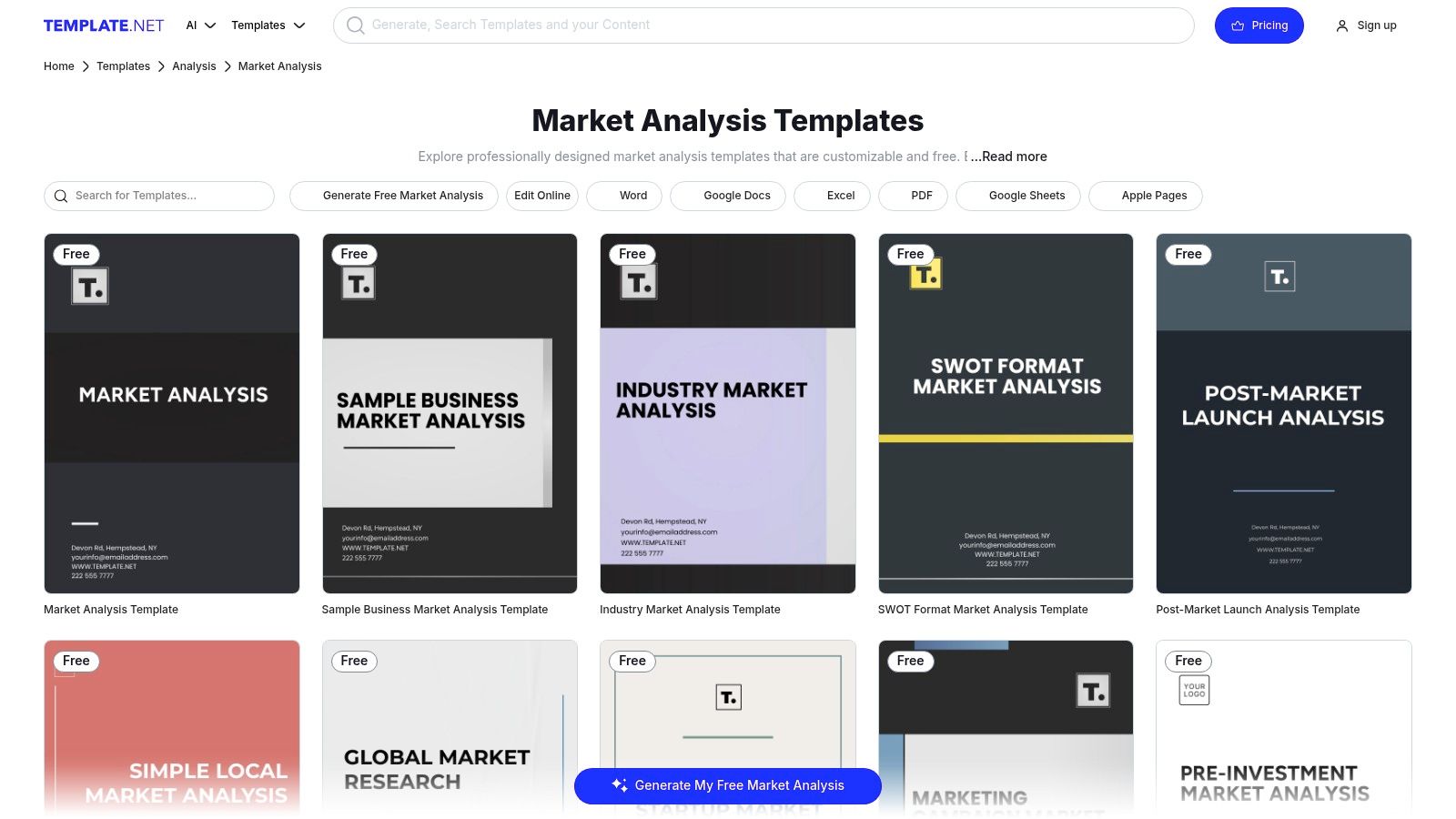
The real value here is speed and convenience. Instead of staring at a blank page, you get a ready-to-fill document that guides you through the necessary sections. Many templates can be edited directly in your browser before you download, which is a nice touch. It's the perfect resource when you need to produce a professional-looking market analysis document quickly without reinventing the wheel.
Why It's a Great Resource
- Best For: Creating formal business documents, quick report generation, and users who prefer traditional formats like Word or Google Docs.
- Standout Feature: The sheer variety of downloadable formats for each template ensures you can work in the software you're most comfortable with.
- Limitations: The designs are very document-centric and can feel a bit dated. They lack the visual flair needed for a modern slide deck, and many of the best templates are locked behind a premium subscription.
Website: https://www.template.net/analysis/market
8. Slidesgo
Sometimes, you don't need a complex spreadsheet; you need to present your findings to the team, investors, or your boss. Slidesgo is your go-to for turning dense market data into a visually compelling presentation. It’s a massive library of free and premium templates for Google Slides and PowerPoint, designed to make your market analysis look sharp and professional without hours of design work. You can find everything from competitor deep-dives to target audience profiles, all ready to be customized.
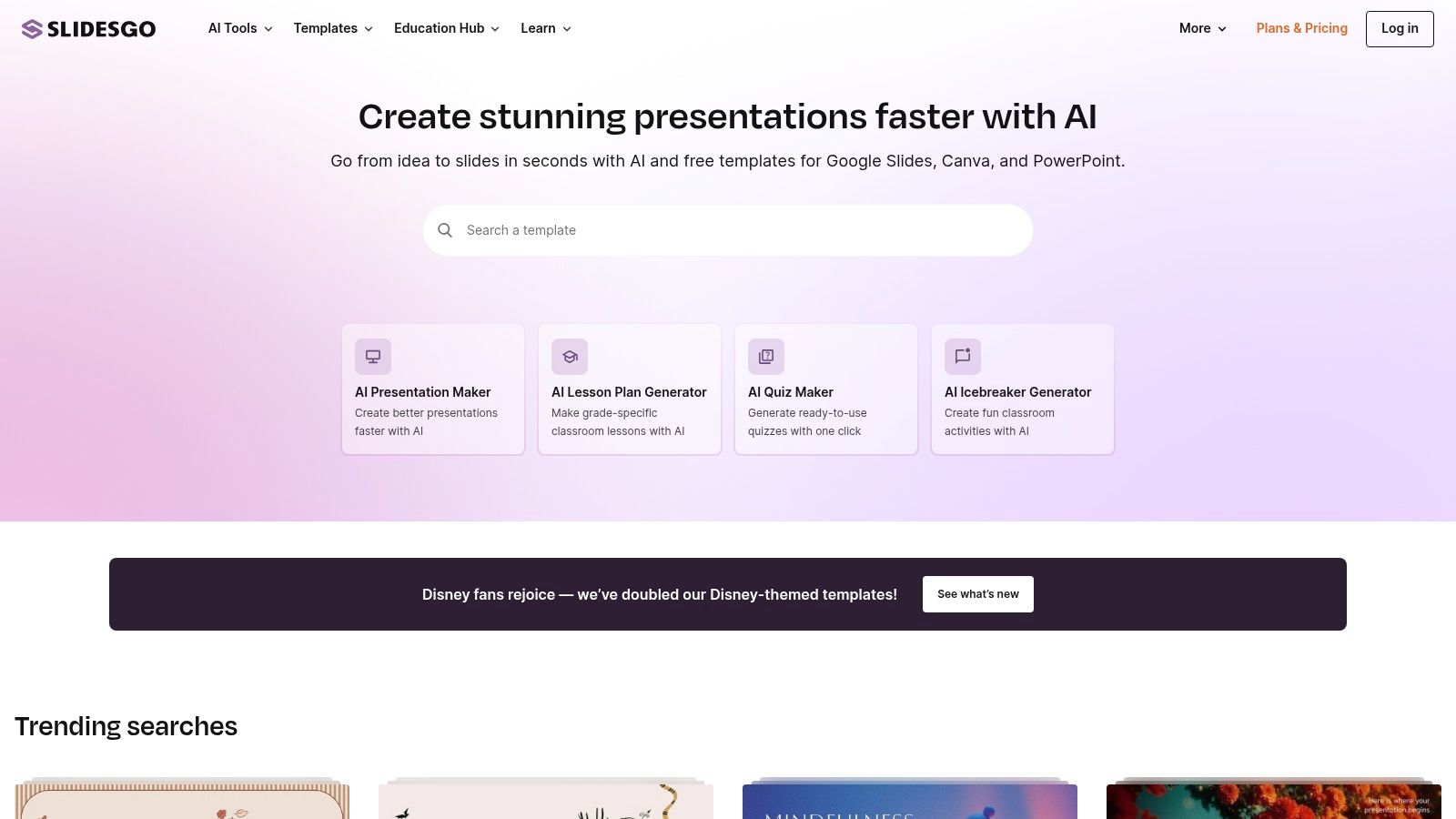
The platform is incredibly straightforward. You find a design you like, download it, and start dropping in your own data and text. The templates come pre-loaded with editable charts, maps, and timelines, saving you from the headache of building them from scratch. It’s perfect for that final step of communicating your analysis.
Why It's a Great Resource
- Best For: Presenting market research findings, creating investor pitches, and visualizing competitive landscapes.
- Standout Feature: The sheer variety and design quality of its market analysis templates. You can quickly find a themed slide deck that matches your company's branding and export it in minutes.
- Limitations: The primary focus is on presentation, not data collection or analysis itself. Also, the free versions require you to keep an attribution slide, which might not look professional.
Website: https://slidesgo.com/
9. Creative Market
Creative Market is an online marketplace where independent designers sell their digital assets. If you need a visually stunning market research deck, this is the place to look. Instead of a standard spreadsheet, you'll find professionally designed templates for PowerPoint, Keynote, Google Slides, and even Canva that make your analysis look polished enough for a board meeting or investor pitch. You buy them individually, so there's no subscription required.
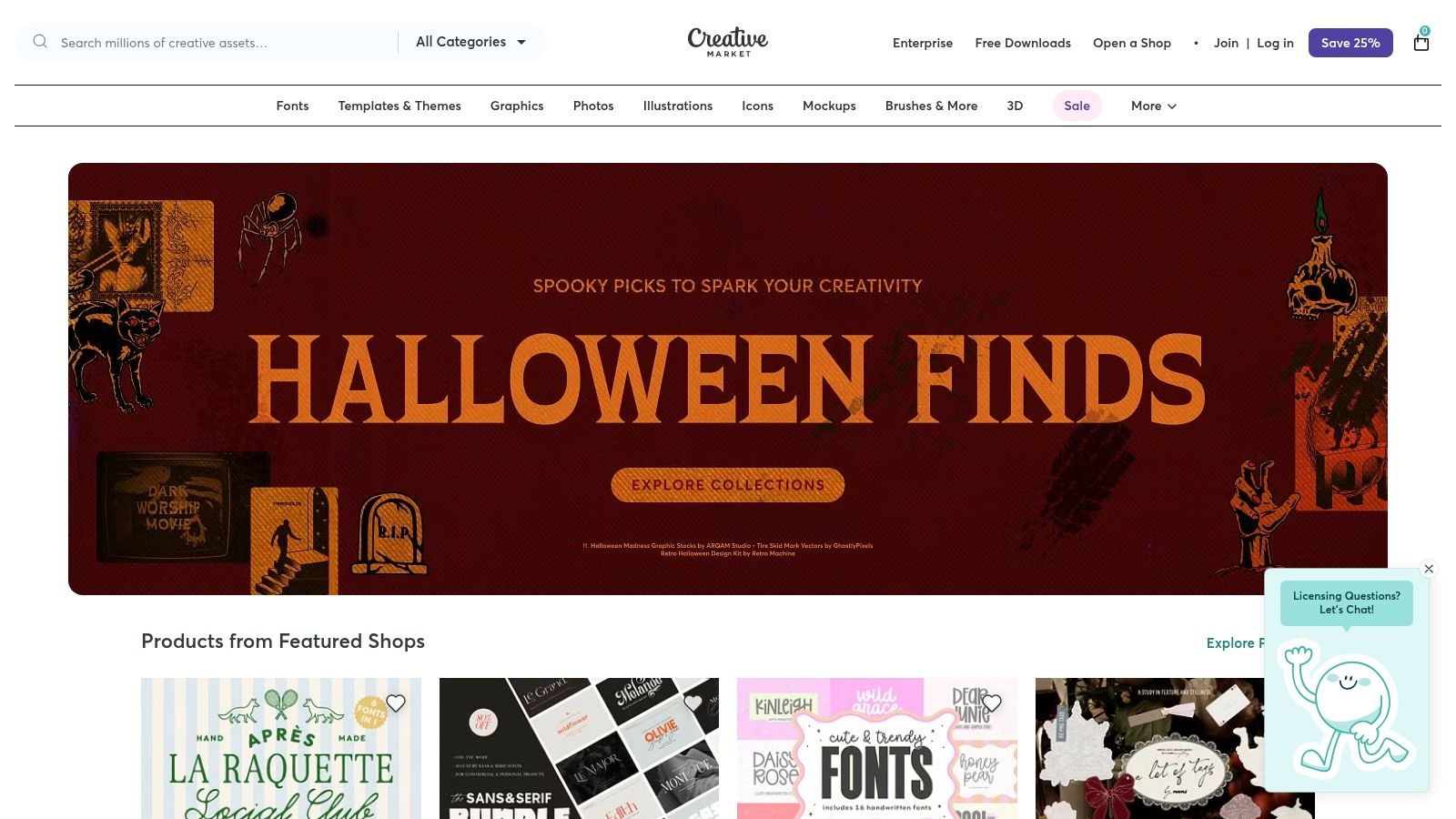
The platform is perfect for one-off projects where you want a unique aesthetic. Since you're buying from individual creators, the variety is huge. You can find everything from minimalist SWOT analysis slides to elaborate, data-heavy PESTLE frameworks. Just be sure to read the reviews and check what's included, as quality can vary from one seller to another.
Why It's a Great Resource
- Best For: Creating polished, presentation-ready market analysis decks for investors or stakeholders.
- Standout Feature: The "pay-as-you-go" model. You can find high-quality market analysis templates without committing to a monthly fee, and many come with bonus icon sets and multiple color themes.
- Limitations: Quality and comprehensiveness are not standardized. You'll need to vet each seller's product to ensure it meets your specific needs, as some are more focused on design than substance.
Website: https://creativemarket.com/
10. Notion Template Gallery
Notion is less a template and more a set of powerful building blocks for creating your own perfect market analysis hub. It excels at creating "living documents" that blend rich text, databases, and embedded content. Instead of a static report, you build a dynamic workspace where you can track competitors, log research findings, and manage market data all in one interconnected system. It's the ultimate tool for teams that want their analysis to evolve with their project.
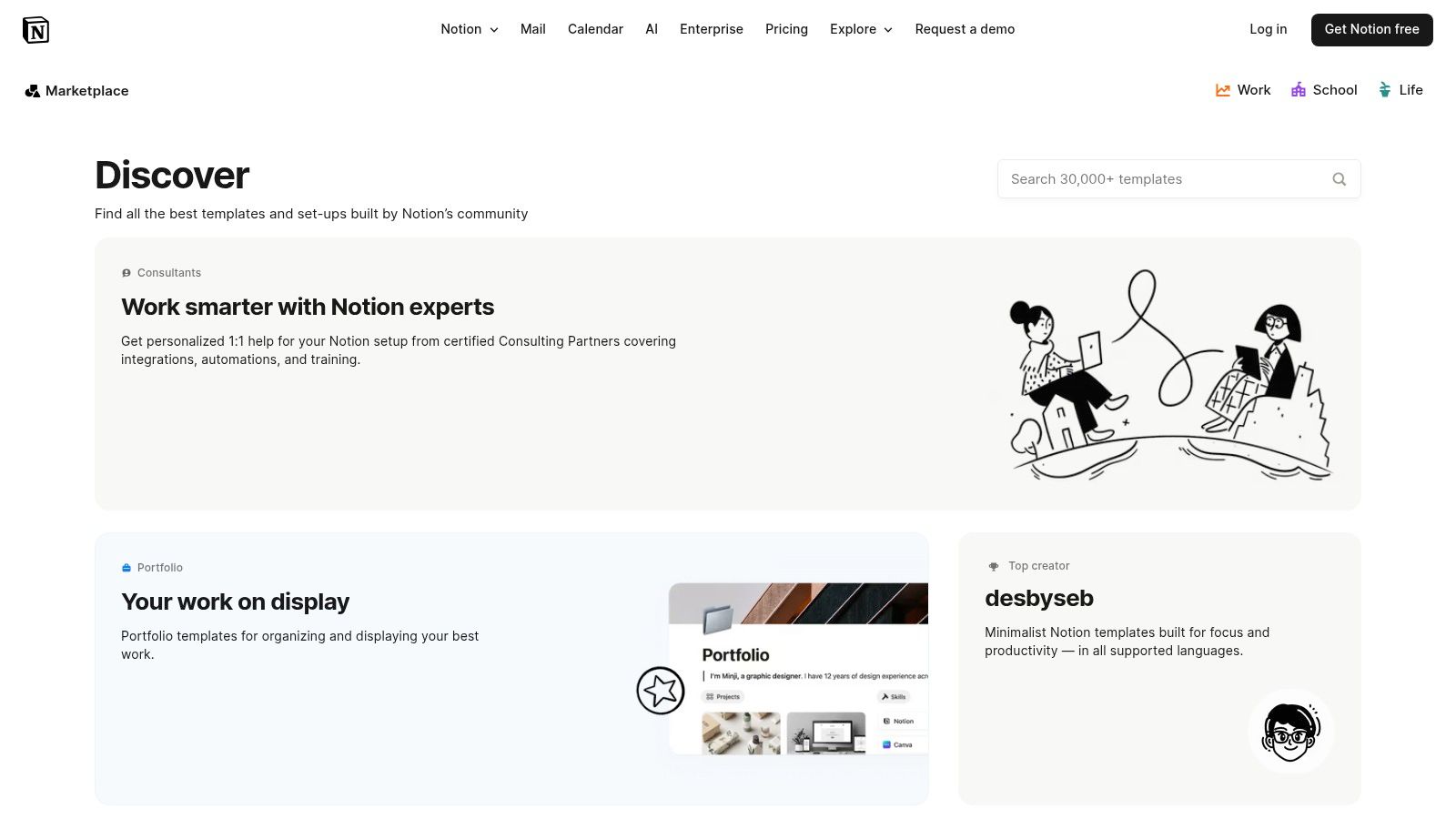
The platform's strength lies in its database functionality. You can create a table of competitors with custom properties like "Key Differentiators," "Funding," and "Last Update," then view that same data as a Kanban board or gallery. This makes it incredibly easy to see your analysis from multiple angles. For a deeper dive, check out this guide to building a competitor analysis template in Notion.
Why It's a Great Resource
- Best For: Teams creating ongoing, collaborative market intelligence systems and living research documents.
- Standout Feature: Its deep customizability. You can build interconnected databases that link your market research notes directly to your competitor profiles and product roadmap, creating a single source of truth.
- Limitations: The learning curve can be steep if you're just looking for a quick fill-in-the-blanks template. It’s also not ideal for creating a polished, presentation-ready slide deck.
Website: https://www.notion.so/templates
11. Coda Gallery
Coda takes the concept of a document and injects it with the power of a database and an app. Instead of a static Word doc or a flat spreadsheet, Coda's Gallery offers interactive documents that can be customized with tables, buttons, and automations. It’s perfect for creating a living, breathing market analysis that your team can constantly update and interact with. Think of it as a command center for your research.
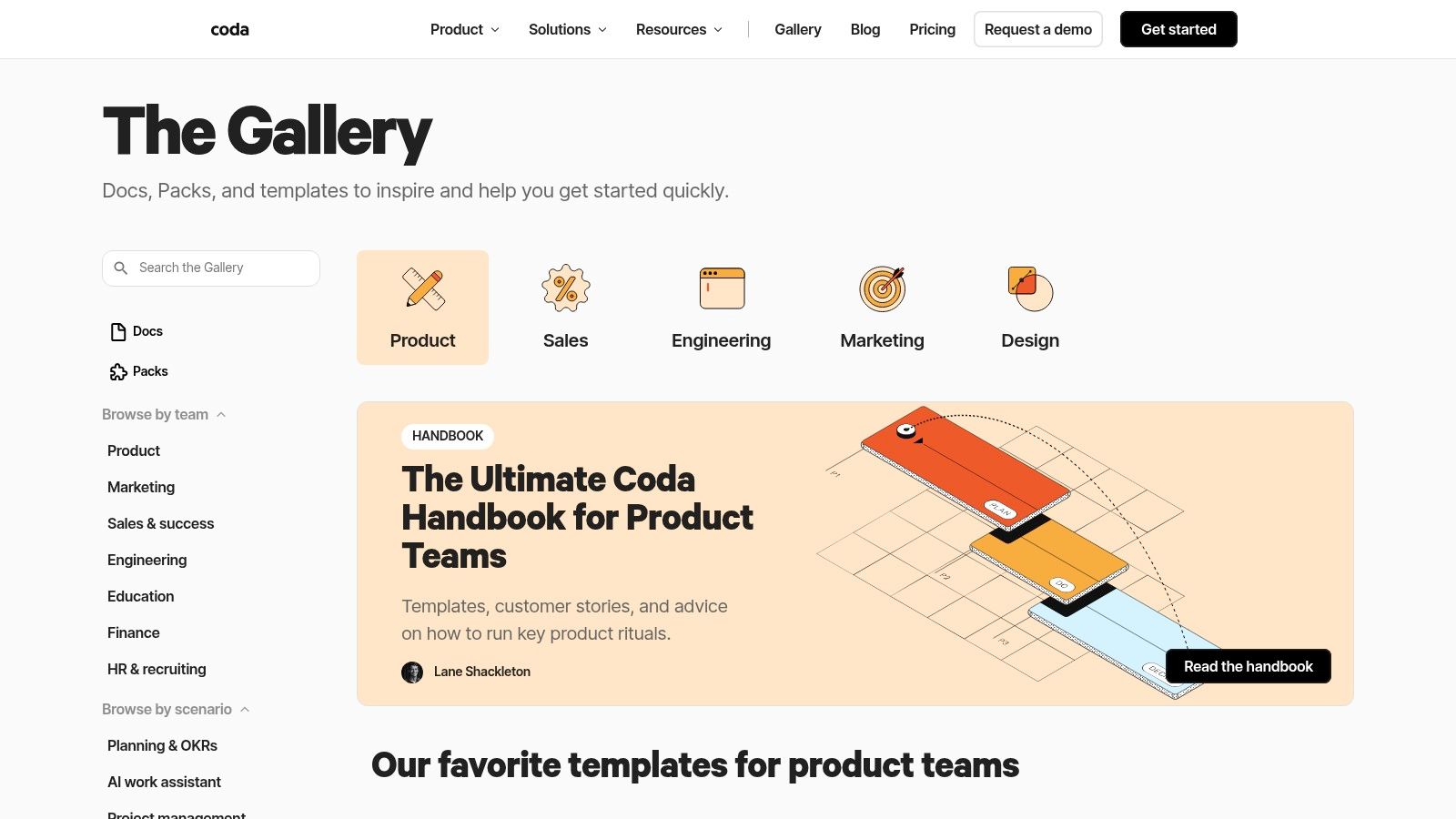
The platform excels at structured frameworks like Porter’s Five Forces or detailed competitor comparison tables. You can build views that filter competitors by specific features or create buttons that trigger research workflows. It turns your analysis from a one-time report into a repeatable, dynamic process that evolves with the market.
Why It's a Great Resource
- Best For: Teams that need a structured, database-driven approach to market research and repeatable analysis processes.
- Standout Feature: The "Packs" integrations allow you to pull live data directly into your documents from other tools, making your market analysis templates automatically update.
- Limitations: The platform’s power comes with a bit of a learning curve. If you’re not used to relational databases or formulas, some advanced features might feel intimidating at first. A free plan is available, but team features and larger doc sizes require a paid subscription.
Website: https://coda.io/gallery
12. Airtable (Templates and AI Plays)
Airtable takes the concept of a spreadsheet and turns it into a powerful, living database for your market intelligence. It’s less about a one-off report and more about creating an "always-on" repository. You can use their bases for competitive analysis, tracking customer insights, or even building a competitive feature radar that you update continuously. With multiple views like grids, kanbans, and custom interfaces, you can visualize your data in ways that make sense for your team.
This platform excels at transforming static analysis into a dynamic, collaborative workspace. The real magic happens when you connect it to automations or use their AI "plays" to synthesize web intel, like summarizing customer reviews automatically. To dive deeper, explore why and where to find highly effective Airtable templates that can jumpstart your process. This approach is fundamental for any modern market analysis for startups, turning data into an actionable asset.
Why It's a Great Resource
- Best For: Ongoing market monitoring, building a live competitive intelligence dashboard, and centralizing customer feedback.
- Standout Feature: The combination of customizable databases (bases) with AI and automation allows you to create a self-updating system for market analysis that you can't get from a static file.
- Limitations: It requires more initial setup than a simple spreadsheet. The platform’s true power is only realized when the base is actively maintained over time.
Website: https://www.airtable.com/solutions/templates
Top 12 Market Analysis Template Comparison
| Tool | Core features ✨ | UX / Quality ★ | Price / Value 💰 | Target audience 👥 | Standout 🏆 | |---|---:|:---:|:---:|:---:|:---:| | Miro | Template gallery + real‑time whiteboard; market frameworks | ★★★★☆ — collaborative, visual | 💰 Free tier; paid for advanced collaboration | 👥 Remote teams, workshop facilitators | 🏆 Interactive boards + Miroverse templates | | Smartsheet | Downloadable Word/Excel/PPT templates; dashboards & tracking | ★★★★☆ — business‑grade, structured | 💰 Many free templates; paid for full features | 👥 Ops teams, PMs, analysts | 🏆 Integrates templates into live sheets/dashboards | | HubSpot | Professionally structured PPT/Slides market decks | ★★★★☆ — polished, presentation‑ready | 💰 Free (gated download) | 👥 Marketers, startups, investor decks | 🏆 High‑quality, investor‑friendly slide designs | | SlideModel | Premium editable slides + vector diagrams | ★★★★☆ — executive visuals | 💰 Subscription for full downloads | 👥 Exec teams, design‑focused presenters | 🏆 Purpose‑built market diagrams & themes | | Envato Elements | Unlimited downloads: slides, icons, infographics | ★★★★☆ — consistent creator quality | 💰 Subscription — excellent for volume | 👥 Agencies, designers, frequent creators | 🏆 Commercial license + vast asset library | | Canva | Drag‑and‑drop editor, templates, collaboration | ★★★★☆ — very approachable | 💰 Freemium; Pro/Teams for best assets | 👥 Non‑designers, small teams | 🏆 Ease of use + real‑time collaboration | | Template.net | Ready‑to‑fill docs: Word/Sheets/PDF | ★★★☆☆ — document‑centric | 💰 Many free; premium catalog available | 👥 Business writers, report authors | 🏆 Quick, document‑ready starting points | | Slidesgo | Free & premium editable slide decks (Slides/PowerPoint) | ★★★★☆ — many free designs | 💰 Free (attribution); premium removes attribution | 👥 Educators, quick deck builders | 🏆 Large free template collection | | Creative Market | One‑off template purchases from creators | ★★★☆☆ — quality varies by seller | 💰 Pay‑per‑item; no subscription required | 👥 One‑off buyers, freelancers | 🏆 Buy singular, designer‑made templates | | Notion Template Gallery | Shareable pages, databases, living docs | ★★★★☆ — great for ongoing notes & tracking | 💰 Templates free; workspace plans for teams | 👥 Teams needing living research docs | 🏆 Integrates notes, evidence & data in one place | | Coda Gallery | Interactive docs with buttons, automations | ★★★★☆ — structured, extensible | 💰 Free templates; paid for advanced packs | 👥 Product teams, analysts, ops | 🏆 Automations & repeatable research workflows | | Airtable (Templates + AI) | Bases + AI plays, multiple views & automations | ★★★★☆ — powerful live monitoring | 💰 Freemium; paid for advanced automations | 👥 Market intelligence teams, scaleups | 🏆 AI plays + integrations for always‑on intel |
Templates Are Great, But Your Data Is What Matters
So there you have it, the best market analysis templates out there. We’ve covered everything from collaborative whiteboards in Miro to polished slide decks from Envato Elements. The right template can genuinely transform a messy pile of notes into a clear, compelling story that gets your team, your boss, or your investors to sit up and pay attention.
But let’s be real. The most beautiful template in the world is just an empty box without solid data to fill it. A stunning SWOT analysis slide is useless if your "Threats" section is based on a gut feeling you had in the shower. This is where most projects die, bogged down by the soul-crushing manual labor of research.
From Blank Canvas to Actionable Insights
Your next steps shouldn't be about finding the perfect font. They should be about building a rock-solid foundation of data. Here’s a simple game plan:
- Define Your Goal: Before you download anything, ask yourself what you’re trying to achieve. Are you validating a new product idea? Pitching for funding? Or trying to find a gap in the market? Your goal determines what data you need to hunt down.
- Pick Your Weapon: Don't just grab the first template that looks cool. If you're working with a team, something collaborative like Miro or Notion is probably your best bet. If you're presenting to executives, a polished deck from SlideModel will make you look like a pro.
- Automate the Grunt Work: This is the most important step. You could spend the next week manually scraping websites, sifting through app store reviews, and digging through old forums. Or you could let technology do the heavy lifting.
The Real Secret: Smart Data Collection
This brings us to the elephant in the room: where does the data come from? Tools like Ahrefs or Semrush are industry standards, but they come with a hefty price tag that can make a startup founder's eyes water. That’s where smart automation comes in.
This is where a tool like Already.dev shines. It’s built to do that painful, upfront research for you. Just feed it your idea, and its AI agents crawl hundreds of sources to find your competitors, analyze their positioning, and even uncover failed startups you can learn from. It hands you a comprehensive report in minutes, giving you all the raw material you need to populate these awesome market analysis templates.
Ultimately, a template is just a guide. Your insights, backed by solid data, are what will make the difference. The ultimate power combo is using a smart tool to gather the intel and a great template to present it. This approach lets you skip the tedious research and jump straight to the strategic thinking that actually builds businesses.
Ready to fill those templates with data that matters? Stop guessing and start analyzing. Let Already.dev handle the painful competitor research so you can focus on strategy and growth. Get your complete market analysis in minutes at Already.dev.